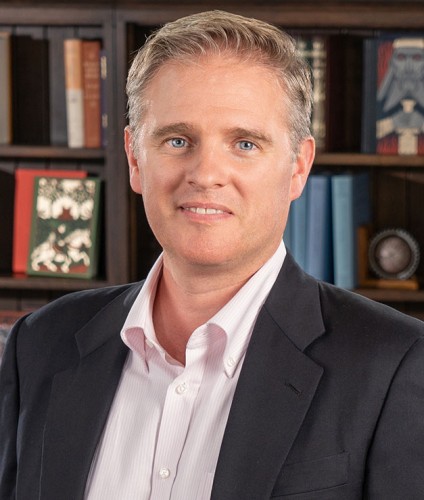
Micah Myers joined Kenyon in 2013. He previously held positions at North Carolina State University and Indiana University, Bloomington. Myers teaches Latin and Greek language courses, as well as courses in translation on ancient literature and culture. His research focuses on Latin poetry and on travel in the ancient world. Read more at kenyon.
Areas of Expertise
Latin literature, ancient travel, Greek lyric poetry.
Education
— Doctor of Philosophy from Stanford University
— Bachelor of Arts from Univ of California Santa Cruz
Courses Recently Taught
This course introduces students to the masterpieces of the ancient Greek world in English translation and to the extraordinary civilization that produced them. We explore the development of Greek civilization through celebrated texts -- for example, Homer's "Iliad" and "Odyssey"; the poetry of Sappho; plays by Aeschylus, Sophocles and Euripides; and Plato's philosophical dialogues -- as well as through lesser-known but still fascinating works. We work toward a better understanding of the texts themselves, the people and the culture that produced them, and the enduring relevance they hold for us today. This counts toward the core requirement for the major. No prerequisite. Offered every other year.
This course introduces students to the masterpieces of the ancient Roman world in English translation and to the extraordinary civilization that produced them. We explore the development of Roman civilization through celebrated texts -- for example, the plays of Plautus, Terence and Seneca; Cicero's speeches; the poetry of Catullus, Horace, Vergil and Ovid; and the novels of Petronius and Apuleius -- as well as through lesser-known but still fascinating works. We work toward a better understanding of the texts themselves, the people and the culture that produced them, and the enduring relevance they hold for us today. This counts toward the major. No prerequisite. Offered every other year.
In this capstone course, the content of which changes on a regular basis, students study closely a particular topic in classics that benefits from an investigation based on a wide range of approaches (e.g., literary, historical, archaeological). The course seeks to further students' skills in written and verbal communication. Each student writes a major research paper on a subject related to the topic of the seminar and outlines the results of the inquiry in an oral presentation. This counts toward the major. Restricted to classics majors and minors. Senior standing. Offered every year.
This course offers independent study for senior candidates for honors. Students enrolled in this course are automatically added to CLAS 498Y for the spring semester. Permission of instructor and department chair required.
This course offers independent study for senior candidates for honors. Permission of instructor and department chair required.
Students improve their skills in reading Greek and discuss scholarship on the author or authors being read that semester. Each semester the readings change, so that GREK 301 and 302 can be taken, to the student's advantage, several times. Students are encouraged to inform the instructor in advance if there is a particular genre, author or theme they would especially like to study. The list of authors taught in this course includes the lyric poets; the playwrights Aeschylus, Sophocles, Euripides and Aristophanes; and great prose stylists such as Plato and Thucydides, to name just a few. Offered every fall.
Students improve their skills in reading Greek and discuss scholarship on the author or authors being read that semester. Each semester the readings change, so that GREK 301 and 302 can be taken, to the student's advantage, several times. Students are encouraged to inform the instructor in advance if there is a particular genre, author or theme they would especially like to study. The list of authors taught in this course includes the lyric poets; the playwrights Aeschylus, Sophocles, Euripides and Aristophanes; and great prose stylists such as Plato and Thucydides, to name just a few. Offered every spring.
Emphasis is placed on improving reading efficiency through careful reading and translation of passages from Vergil's poetry. In addition, students develop an appreciation of the often-subtle intricacies of Vergil's poetic language and the untranslatable music of his verse. Attention is given to both understanding Vergil in his cultural and historical context and exploring his continuing significance. Offered every spring.
In this course, students improve their skills in reading Latin and discuss scholarship on the author or authors being read during the semester. Each semester the readings change, so that LATN 301 and 302 can be taken, to the student's advantage, several times. Students are encouraged to inform the instructor if there is a particular genre, author or theme they would especially like to study. The list of authors regularly taught in this course includes Horace and Ovid; the comic poet Plautus; and great prose stylists such as Livy, Tacitus, Petronius and Augustine, to name just a few. Offered every fall.
In this course, students improve their skills in reading Latin and discuss scholarship on the author or authors being read during the semester. Each semester the readings change, so that LATN 301 and 302 can be taken, to the student's advantage, several times. Students are encouraged to inform the instructor if there is a particular genre, author or theme they would especially like to study. The list of authors regularly taught in this course includes Horace and Ovid; the comic poet Plautus; and great prose stylists such as Livy, Tacitus, Petronius and Augustine, to name just a few. Offered every spring.